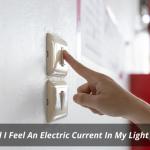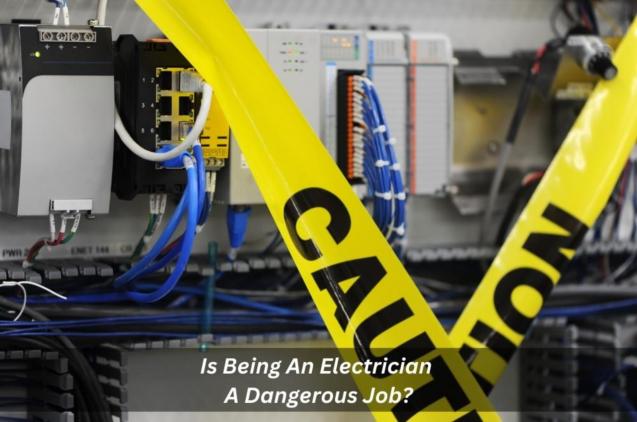
Why Did I Feel An Electric Current In My Light Switch?
By Electrician Near Me Sydney|September 07, 2022
You touched your light fixture switch and felt an electric current run through your body. What was going on? Was it something real or did you imagine that feeling?
Some people get shocks when touching their light switches because the metal contacts inside generate static electricity. If you touch a wire grounded to a metal object you should also feel an electric shock.
In this case, the metal objects are acting like condensers, allowing air currents to charge them positively and negatively. When you touch the metal contact inside the light switch, you become charged too, which then passes onto you via capacitance. The result is an electric current.
Furthermore, there are many factors that can cause a tripped circuit breaker. Some of these include overload, faulty fuse/switch, improperly installed device, electrical short circuit etc.
Electrical current has many names, including voltage and ampère. It's measured in volts, amps or amperes (for short), but don't worry if you can't remember all those numbers. Instead just think of the flow as more or less energy pushing against your hand, fingers or toes.
If the metal contacts inside your light switch aren't grounded properly, you could get shocking amounts of direct current instead of alternating current. Direct current flows from positive to negative without any change in direction.
Alternating current reverses its polarity at regular intervals, creating an oscillation between positive and negative voltages. If the metal contacts inside your switch aren't connected to the ground, you could receive up to 10 million volts per second of direct current! This would give you a nasty electrical burn similar to being hit with lightning.
These high voltages can easily kill someone, so always ensure that grounding connections are safe and well-maintained. Remember to look for signs of corrosion or leaks in wiring, and ensure that your circuit breaker panel is working correctly.
If you're worried about electric current flowing into your house, check that there isn't a loose wire coming out of any sockets or plugs in your home. Also, keep an eye out for any damaged wires around your property, and use caution when moving furniture or appliances. Don't pick up anything wired to earth if you see power lines nearby. Check the fuse box in your home, and make sure that it's not faulty.
How to prevent an electrical shock?
Who hasn't been shocked at least once during their life? Electrical surges shocks occur when electricity passes through our body and causes unwanted stimulation or injury. This can happen because of faulty wiring, damaged power lines, defective appliances, and even loose connections.
These problems usually cause pain, burning sensation, numbness, tingling, etc. If you get electric shocks often, you should seek medical attention immediately.
Electrocution is one of the leading causes of accidental death worldwide. One such example is teenagers who play with power tools. They may experience burns and other injuries from touching exposed metal parts. In some cases, they may even die from a heart attack due to shock.
Keep away from dangerous areas and devices. Most accidents related to electrical wiring hazards take place inside homes. Avoid using extension cords if possible and make sure outlet cover plates are closed properly.
Check for voltage frequent surges and ensure that appliances are grounded before plugging them into outlets. Use surge protectors that provide protection against lightning strikes, static discharge, short circuits, and overloading. Stay alert and aware of any unexpected electrical problems. If you sense danger, contact an emergency electrician right away or search for an “electrician near me” online.
Electricity has become a part of everyday life, but it also carries risks. From power outages to electrocutions, you need to be prepared. Here are some things you should keep in mind to avoid electrical issues:
What are electrical emergencies?
Electricity is vital to life. Whether you live in the city or rural areas, electricity is often taken for granted. Electrical power helps support modern society, from powering homes and businesses to keeping our lights on at night.
The electric system was designed to provide reliable service 24/7, 365 days a year. When it goes down, it takes time to get it back up. This means that we should always be prepared for an emergency.
Emergency readiness involves having pre-planned procedures that involve multiple departments, such as local electricians, fire and police. There are several ways to prepare for an emergency situation, depending on where you live. For instance, you can build a family plan for what to do in case of a power outage. It includes emergency lighting (solar powered), food storage, a first aid kit, etc.
It is important to have a smoke alarm in your home or business. It is the most effective way of saving lives in the event of a fire and it can save you from other serious health risks, including carbon monoxide poisoning and respiratory diseases. It is highly recommended to hire an electrical contractor for all your electrical work issues to avoid any accidents and lower the cost of your electrical bill.
Some people get shocks when touching their light switches because the metal contacts inside generate static electricity. If you touch a wire grounded to a metal object you should also feel an electric shock.
In this case, the metal objects are acting like condensers, allowing air currents to charge them positively and negatively. When you touch the metal contact inside the light switch, you become charged too, which then passes onto you via capacitance. The result is an electric current.
Furthermore, there are many factors that can cause a tripped circuit breaker. Some of these include overload, faulty fuse/switch, improperly installed device, electrical short circuit etc.
Electrical current has many names, including voltage and ampère. It's measured in volts, amps or amperes (for short), but don't worry if you can't remember all those numbers. Instead just think of the flow as more or less energy pushing against your hand, fingers or toes.
If the metal contacts inside your light switch aren't grounded properly, you could get shocking amounts of direct current instead of alternating current. Direct current flows from positive to negative without any change in direction.
Alternating current reverses its polarity at regular intervals, creating an oscillation between positive and negative voltages. If the metal contacts inside your switch aren't connected to the ground, you could receive up to 10 million volts per second of direct current! This would give you a nasty electrical burn similar to being hit with lightning.
These high voltages can easily kill someone, so always ensure that grounding connections are safe and well-maintained. Remember to look for signs of corrosion or leaks in wiring, and ensure that your circuit breaker panel is working correctly.
If you're worried about electric current flowing into your house, check that there isn't a loose wire coming out of any sockets or plugs in your home. Also, keep an eye out for any damaged wires around your property, and use caution when moving furniture or appliances. Don't pick up anything wired to earth if you see power lines nearby. Check the fuse box in your home, and make sure that it's not faulty.
How to prevent an electrical shock?
Who hasn't been shocked at least once during their life? Electrical surges shocks occur when electricity passes through our body and causes unwanted stimulation or injury. This can happen because of faulty wiring, damaged power lines, defective appliances, and even loose connections.
These problems usually cause pain, burning sensation, numbness, tingling, etc. If you get electric shocks often, you should seek medical attention immediately.
Electrocution is one of the leading causes of accidental death worldwide. One such example is teenagers who play with power tools. They may experience burns and other injuries from touching exposed metal parts. In some cases, they may even die from a heart attack due to shock.
Keep away from dangerous areas and devices. Most accidents related to electrical wiring hazards take place inside homes. Avoid using extension cords if possible and make sure outlet cover plates are closed properly.
Check for voltage frequent surges and ensure that appliances are grounded before plugging them into outlets. Use surge protectors that provide protection against lightning strikes, static discharge, short circuits, and overloading. Stay alert and aware of any unexpected electrical problems. If you sense danger, contact an emergency electrician right away or search for an “electrician near me” online.
Electricity has become a part of everyday life, but it also carries risks. From power outages to electrocutions, you need to be prepared. Here are some things you should keep in mind to avoid electrical issues:
- Unplug all plugged items while you sleep
- Turn off appliances before going to bed
- Be careful how you handle electrical appliances
- Remove shoes and jewellery before entering the bedroom
- Do not touch bare copper wires
- Keep water pipes free from nails and rough surfaces
- Do not leave wet towels on the floor
- Never put your hands on live electrical equipment
What are electrical emergencies?
Electricity is vital to life. Whether you live in the city or rural areas, electricity is often taken for granted. Electrical power helps support modern society, from powering homes and businesses to keeping our lights on at night.
The electric system was designed to provide reliable service 24/7, 365 days a year. When it goes down, it takes time to get it back up. This means that we should always be prepared for an emergency.
Emergency readiness involves having pre-planned procedures that involve multiple departments, such as local electricians, fire and police. There are several ways to prepare for an emergency situation, depending on where you live. For instance, you can build a family plan for what to do in case of a power outage. It includes emergency lighting (solar powered), food storage, a first aid kit, etc.
It is important to have a smoke alarm in your home or business. It is the most effective way of saving lives in the event of a fire and it can save you from other serious health risks, including carbon monoxide poisoning and respiratory diseases. It is highly recommended to hire an electrical contractor for all your electrical work issues to avoid any accidents and lower the cost of your electrical bill.



